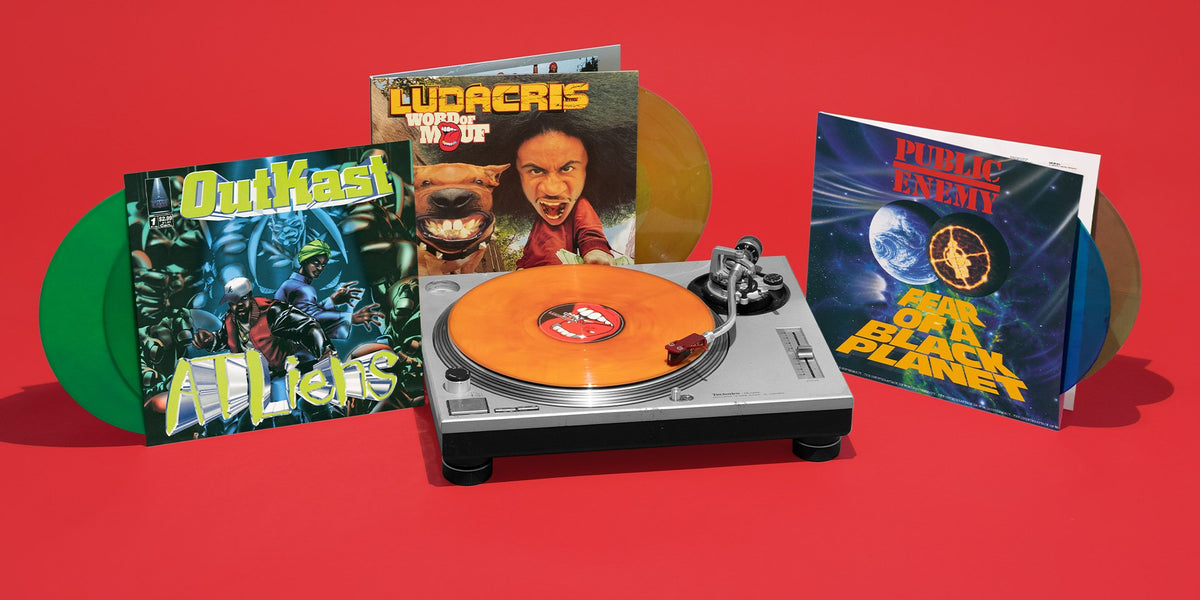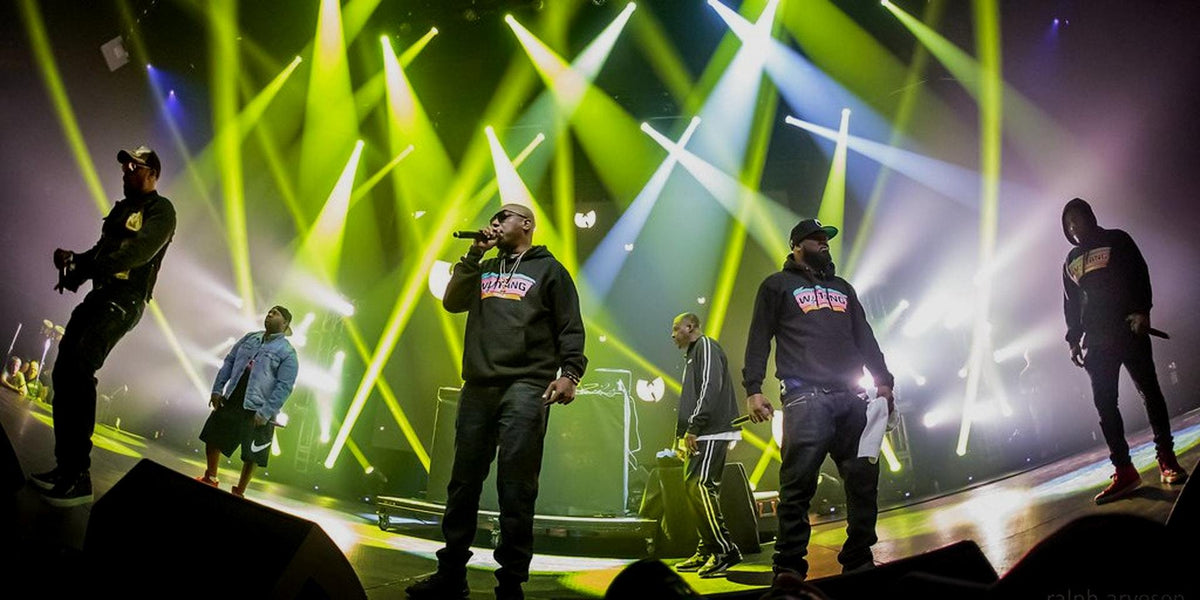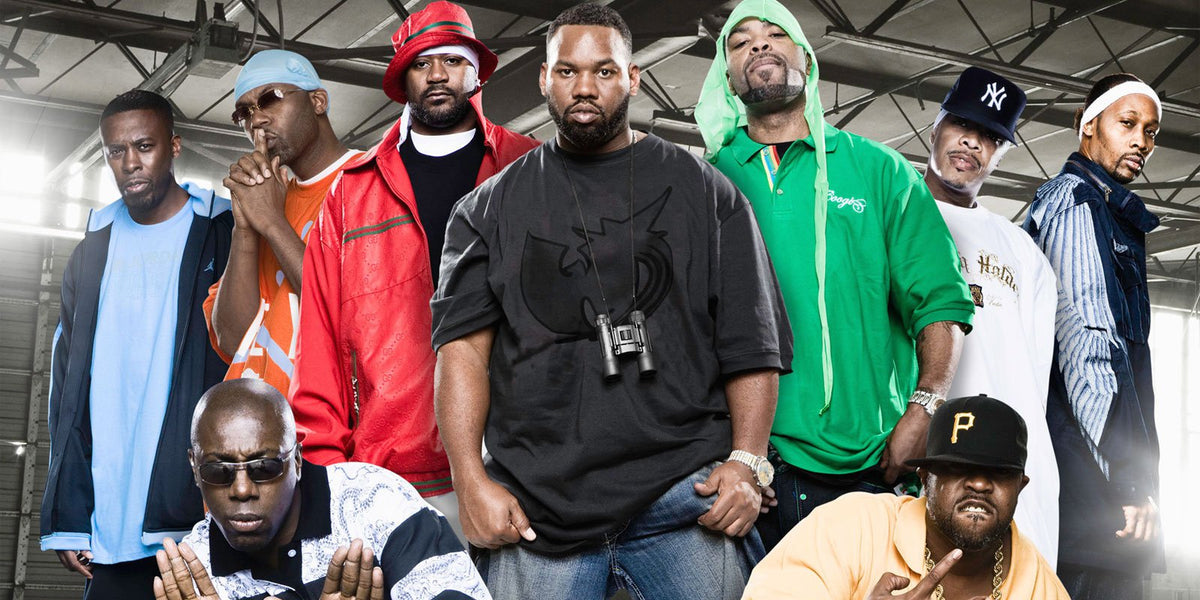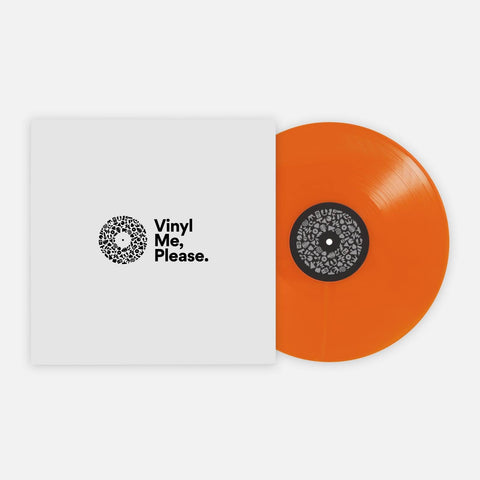Public Enemy Fought the Power and Won
On ‘Fear of a Black Planet’ and Its Impact
The important thing to remember about Public Enemy’s Fear of a Black Planet is that it almost didn’t happen.
It’s hard to imagine any group hot off the success of a Platinum-selling album — 1988’s incendiary It Takes a Nation of Millions to Hold Us Back — with a live show that equally enthralled and disgusted white audiences around the globe calling it quits so quickly after their big break. A crossroads appeared abruptly, a fork in the road amplified by the haze of celebrity.
In 1989, Richard “Professor Griff” Griffin was thrust into a last-minute interview with The Washington Times. Public Enemy’s leader Carlton “Chuck D” Ridenhour was a no-show for the scheduled talk with reporter David Mills, and the publication would take what it could get. Griff didn’t rap on, write for or produce any of the group’s music at the time, but, as Public Enemy’s appointed Minister of Information and the head of their S1W security unit, he was a tertiary figure who frequently shared the stage with them. His tendency toward homophobic and anti-Semitic remarks in interviews, which had flown under the radar before, would haunt the group as their latest single “Fight The Power” — which was initially created for Spike Lee’s 1989 breakout film Do The Right Thing — bombarded the airwaves.
Griff spent the interview putting his foot in his mouth, calling Jews “wicked” and claiming they funded the transatlantic slave trade, among other things. The group — consisting of Chuck, rapper and hype man Flavor Flav, DJ Terminator X and their security detail — was on tour when the talk was published, and the backlash was swift: The Jewish Defense Organization called for boycotts of Public Enemy albums and picketed screenings of Do The Right Thing; talking heads on radio and television reduced the group’s Afrocentric messages to lunkheaded hate-mongering.
As the controversy swelled, a group well-known for taking the fight to the system was now playing a cautious defense. Griff was ultimately removed from the group after Shocklee and Def Jam president Bill Stepheny threatened to back out of a lucrative deal for the group’s next album (Griff rejoined later and apologized for his comments). A series of confusing press releases and declarations followed, putting Public Enemy’s future in jeopardy. Eventually, the group entered a brief self-imposed exile in order to take the heat off Lee, whose film was now caught in the crossfire.
Even in their silence, the fire of “Fight The Power” continued to singe the edges of American racism as it blasted out of JVC boomboxes from Roosevelt, Long Island, to Compton, California. Where the production on Nation of Millions saw The Bomb Squad — the production team comprised of Chuck, Eric Sadler and brothers Hank and Keith Shocklee — use its kitchen-sink beat structure to create an eardrum-shredding low-end with the fewest parts possible, “Fight The Power” was more interested in a serrated groove. “I wanted you to feel the concrete, the people walking by, the cars that are going by, and the vrroom in the system. I wanted the city,” Hank Shocklee explained to Rolling Stone. “I wanted that grittiness, the mugginess, the hot sticky, no-air vibration of the city.”
The “sound of the funky drummer” was made to drip like sweat during a hot New York summer and be sharp enough to cut your ear off. The wall of sound Shocklee and The Bomb Squad created for “Fight the Power” is the type modern producers can only dream of: there are 17 samples in the first 10 seconds alone. The beat is as viscous and biting as McDonald’s Sprite, the kind only a voice as clear and booming as Chuck D’s could ever hope to match. “Fight The Power’’ is a song made for the crowds “swingin’ while I’m singin’, givin’ whatcha gettin’,” for people dancing on the edge of a pot ready to boil over.
Nowhere is this more apparent than the start of the song’s third verse, where Chuck and Flav unleash a generation’s worth of frustration on two TV Land mainstays: “Elvis was a hero to most but he never meant shit to me / you see, straight out racist that sucker was; simple and plain / Motherfuck him and John Wayne.” Public Enemy had planted its foot within the Black musical pantheon two albums prior, but “Fight The Power” was the twist of the heel the group had been looking for.
Chuck told Rolling Stone that, because the extended version of the song featuring saxophone solos by jazz great Branford Marsalis was featured in the movie so many times, it would have a higher impact than it would on radio. Marsalis put it in better words: “They had the greatest marketing tool in the world. They had a movie that people were going to see two and three times, that was going to be all over the world and it scared white people half to death — which ensured that it was going to sell.”
The group’s provocation of white audiences dovetailed seamlessly with audience reactions to Do The Right Thing. Tensions were high after the police murders of Eleanor Bumpurs in the Bronx in 1984, Edmund Perry in Manhattan in 1985 and Yusef Hawkins in Bensonhurst, Brooklyn in 1986. Public Enemy, like many, wanted action. “Fight The Power” spoke directly to the righteous rage stoking New York and the nation at large as racism and death continued to linger in the wake of the civil rights movement’s end nearly two decades prior. It was a peek at the synthesis of rage and funk that would come to define Fear of a Black Planet.
In the process of creating their third studio album, Public Enemy still had much to prove. Label expectations following the success of Nation of Millions and detractors amid the Griff controversy aside, the group was ready to deliver something more focused and undeniable than before: “[A] deep, complex album,” as Chuck later told Billboard.
The title Fear of a Black Planet was inspired by Dr. Frances Cress Welsing’s Color-Confrontation Theory; the study posited that white people were afraid that the mixing of the so-called “races,” which produced children of color, would mean that white people would eventually cease to exist. The writing of Black Planet was fueled by all of this as well as a desire to make music that would play better in a live setting. To The Bomb Squad, heaping spoonfuls of funk would help the medicine go down.
The album’s first single, “Welcome to the Terrordome,” uses this methodology to blow open the door to the “Brain game, intellectual Vietnam” going on in Chuck’s — and, by extension, Black America’s — mind. He has a lot to sound off about: the Griff controversy (“Apology made to whoever pleases / Still they got me like Jesus”); the idea that all skin folk ain’t kinfolk (“Every brother ain’t a brother just ’cause of color / Just as well could be undercover”); the then-very recent killing of Yusef Hawkins (“Nothing’s worse / Than a mother’s pain of a son slain in Bensonhurst”). The song is a tour of a battleground scorched by the flames of hatred. The only thing keeping the wounds from metastasizing is the bed of samples Chuck raps over: “Hear the drummer get wicked,” the song’s fourth line, is as much a statement of intent as it is a call to action.
“Welcome to the Terrordome,” like Black Planet as a whole, is packed with ideas of Black Liberation Theory and tributes to revolutionary figures like Malcolm X and Huey P. Newton that seep through where earlier songs bludgeoned. The warrior-preacher projection of Chuck’s voice is still clear as ever, but the message lands differently over this collage of found-sound funk. It’s the platonic ideal of edutainment, something edgy to move your feet to, but just concerned and earnest enough for the inevitable message to not be corny.
The funk they were looking for didn’t come easy. The late 1980s and early 1990s were an unprecedented era for sampling outside sources; artists weren’t required to get permission from or pay other artists to use their music, giving producers free rein to pull from whatever source material they wished. It was a world unencumbered by the watchful eyes of sample clearance lawyers that would be established in the wake of Gilbert O’Sullivan’s lawsuit against Biz Markie in 1991.
Markie had sampled some of the piano riffs from O’Sullivan’s song “Alone Again (Naturally)” on his own song “Alone Again” from his 1991 album I Need a Haircut. Markie and his team actually reached out to O’Sullivan as a gesture of good faith, and when the musician denied the request, the label, Cold Chillin’, released the song anyway on some real hip-hop shit. O’Sullivan promptly dragged them to court, where judge Kevin Duffy ruled against Markie and ordered him to pay $250,000 in damages and barred the label from selling the song or the album. Duffy had unwittingly aimed for the head of hip-hop and nicked its carotid artery. Traditional sampling, once the lifeblood of rap music, would become forbiddingly, expensively difficult for any artist moving forward.
A future with restrictions on sampling was something Public Enemy had predicted would happen on the Nation of Millions song “Caught, Can We Get a Witness?” Still, they had no such worries while creating back in 1989. According to Chuck, Black Planet was jam-packed with somewhere between 150 and 200 different samples across its 20 tracks. The group combed through thousands of records for samples during the album’s production, forming what Hank Shocklee called “a production assembly line.” Shocklee would examine records from a DJ’s perspective, Sadler from a musician’s and Chuck would add flourishes before writing lyrics to bring the album’s theme together. Rumor has it that Shocklee would even stomp on records he planned on sampling if they sounded too “clean” beforehand. “We believed that music is nothing but organized noise,” he once explained. “That’s still our philosophy, to show people that this thing you call music is a lot broader than you think it is.”
Though dense production was already The Bomb Squad’s bread and butter, Public Enemy utilized them with a sharper sense of utility. The group had nothing but tongue-in-cheek ire for the critics and dissenters who’d kicked them while they were down, especially during the Griff fiasco, and each of the album’s interludes pauses the action to throw salt in their eyes.
Opening song “Contract on the World Love Jam” and the penultimate song “Final Count of the Collision Between Us and The Damned” weaved sampled news reports on the group into the breakbeats and Terminator X’s record scratches. “Incident at 66.6 FM” got even more specific, using clips and call-ins from a heated debate between Chuck and radio host Alan Colmes to stick it to The Olds by framing their complaints as the hissing of ignorant hermits. Public Enemy wanted to be understood, but they weren’t above a good nose-tweaking. Besides, the intention was clear: don’t let anybody but us tell you who we are.
Above all, Public Enemy was concerned with Blackness and how the world colludes to subjugate or obliterate it at every turn. Black Planet was no exception, further probing the foundations of a country built by enslaved people recast as second-class citizens. Flavor Flav’s solo cut “911 is a Joke” wrestles with police presence in Black neighborhoods, which always veers toward either Chief Wiggum-levels of incompetence or Ronnie Barnhardt-levels of violent ideation. Two songs examine interracial dating, bemoaning Black people who use their supposed preference for white partners to social climb (“Pollywanacraka”) while asking whites why they’re so afraid of “some color in [their] family tree?” (“Fear of a Black Planet”).
“Anti-Nigger Machine” lifts a line from the Nation of Millions song “Black Steel in the Hour of Chaos” to confront rap censors misinterpreting Public Enemy’s music because they curse and might be a bit angry about racism. “Burn Hollywood Burn” tackles Black stereotypes in film and television with one of the album’s sweetest kiss-offs wrapped in a racist film history footnote: “Some things I’ll never forget, yeah / So step and fetch this shit.” The messages on Black Planet are no less potent than they were on Nation of Millions or even Public Enemy’s 1987 debut, Yo! Bum Rush The Show. Black Planet is more interested in concentration, fitting the group’s big ideas into precise and elaborate containers for maximum impact. Nation of Millions was buckshot; Black Planet was a sniper bullet.
The beats, though still cacophonous and featuring more samples than ever, had been scaled back so Chuck’s voice cuts through differently. He’s not operating above the madness like he is on Nation of Millions standout “Rebel Without a Pause,” with its infamous tea kettle sample. Conversely, Black Planet’s centerpiece, “Power to the People,” sees Chuck bellowing positive affirmations over what sounds like a rap interpretation of Detroit’s ghettotech scene. Shuffling breakbeats power nearly every song, especially “Who Stole the Soul?” and “War at 33 ⅓.” The bulk of Black Planet is staked on beats that manage to be organized noise while flowing through Chuck and Flav’s words like a current.
The lyrical content of Fear of a Black Planet is, sadly, more relevant than ever. In 2021, over 30 years after the album’s release, racism is still widespread; Eleanor Bumpurs and Yusef Hawkins have been replaced by Breonna Taylor, George Floyd and an endlessly rotating cast of names; Hollywood executives lean on rap, the most popular form of music in the world, to determine what’s cool before sucking the life from its bones like Shang Tsung. Any album featuring an everlasting crystal ball of a song like “Fight The Power” — which has inspired rappers from Kanye West to Zack de la Rocha to billy woods — would already be a classic. But Black Planet stakes its claim as a revolutionary album in both form and content.
It was the last hurrah for the Golden Age of sampling, an intricately produced album that took full advantage of massive walls of sound to unearth rap from the space where rock, funk and jazz collide. It’s the album that inspired California rapper Ice Cube’s decision to recruit The Bomb Squad to produce his debut solo album, AmeriKKKa’s Most Wanted. It helped ignite a wave of Afrocentric righteousness in rap: first with direct descendants like A Tribe Called Quest’s People’s Instinctive Travels and The Paths of Rhythm and indirectly in the stately groove of Kendrick Lamar’s To Pimp a Butterfly and the brash internet-savvy confrontation of JPEGMAFIA’s Veteran. More than anything, Fear of a Black Planet is the result of a group that nearly lost control of its narrative wrestling it back from the clamped jaws of white entitlement. Public Enemy fought the power and won.
Dylan “CineMasai” Green is a rap and film journalist, a contributing editor at Pitchfork and the host of the Reel Notes podcast. His work has appeared in Okayplayer, Red Bull, DJBooth, Audiomack, The Face, Complex, The FADER and the dusty tombs of Facebook Notes. He's probably in a Wawa mumbling a BabyTron verse to himself.
Related Articles
Join the Club!
Join Now, Starting at $36Pages







